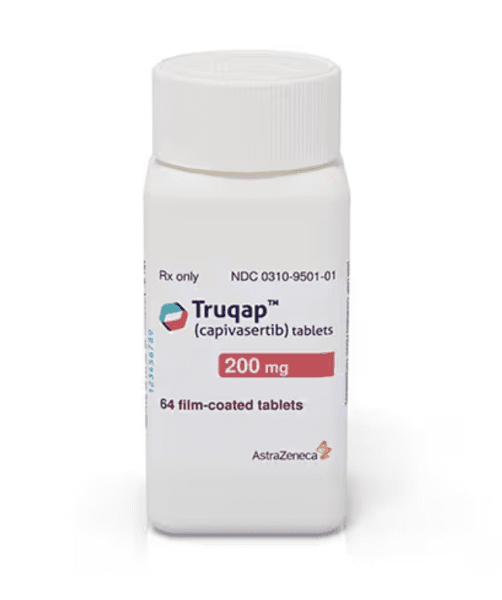Capivasertib Disease Interactions
There are 3 disease interactions with capivasertib.
Capivasertib (applies to capivasertib) diabetes mellitus
Moderate Potential Hazard, Moderate plausibility. Applicable conditions: Diabetes Type 2, Diabetes Type 1, Diabetic Ketoacidosis
Severe hyperglycemia, including diabetic ketoacidosis and fatal outcomes, has occurred in patients treated with capivasertib. The safety of capivasertib in patients with Type 1 diabetes or with diabetes requiring insulin has not been established; these patients were excluded from clinical studies. Fasting blood glucose and hemoglobin A1C should be evaluated and optimized before starting treatment. Regular monitoring of fasting blood glucose as recommended by the manufacturer should be performed during treatment with capivasertib. Consider consultation with a specialist in the treatment of hyperglycemia and initiation of fasting glucose monitoring at home for patients who have risk factors for or who experience hyperglycemia. If hyperglycemia occurs during treatment, the dose of capivasertib may need to be withheld or reduced, or treatment permanently discontinued based on severity or if ketoacidosis is confirmed.
Capivasertib (applies to capivasertib) liver dysfunction
Moderate Potential Hazard, Moderate plausibility. Applicable conditions: Liver Disease
Capivasertib has not been studied in patients with severe hepatic impairment (bilirubin greater than 3 times ULN and any AST). In patients with moderate hepatic impairment (bilirubin greater than 1.5 to 3 times ULN and any AST), additional monitoring for adverse side effects is recommended due to the potential for increased exposure. No dose adjustment is recommended in patients with mild hepatic impairment.
Capivasertib (applies to capivasertib) renal dysfunction
Moderate Potential Hazard, Moderate plausibility.
Capivasertib has not been studied in patients with severe renal dysfunction (CrCl 15 to 29 mL/min). No dose adjustment is recommended in patients with mild to moderate renal dysfunction (CrCl 30 to 89 mL/min).
Switch to professional interaction data
Capivasertib drug interactions
There are 531 drug interactions with capivasertib.
Capivasertib alcohol/food interactions
There is 1 alcohol/food interaction with capivasertib.
More about capivasertib
- capivasertib consumer information
- Check interactions
- Compare alternatives
- Reviews (1)
- Side effects
- Dosage information
- During pregnancy
- Drug class: multikinase inhibitors
- Breastfeeding
- En español
Related treatment guides
Drug Interaction Classification
| Highly clinically significant. Avoid combinations; the risk of the interaction outweighs the benefit. | |
| Moderately clinically significant. Usually avoid combinations; use it only under special circumstances. | |
| Minimally clinically significant. Minimize risk; assess risk and consider an alternative drug, take steps to circumvent the interaction risk and/or institute a monitoring plan. | |
| No interaction information available. |
See also:
Further information
Always consult your healthcare provider to ensure the information displayed on this page applies to your personal circumstances.


